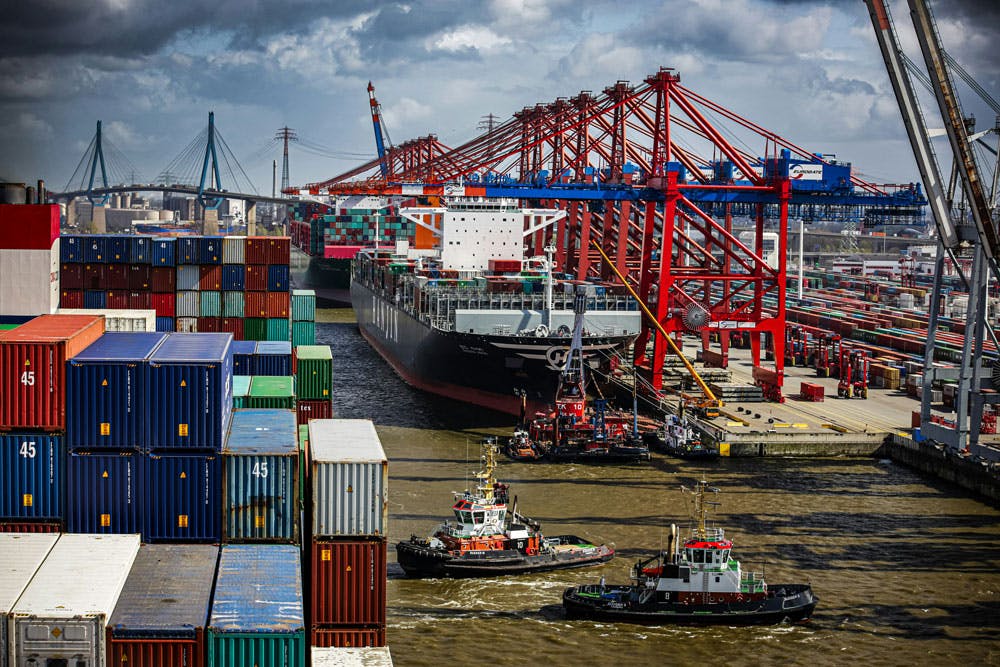Enhancing Value-Adding Capacities: Strategies for Africa in the Global Supply Chain
Go to all updates
The global supply chain is a complex network of interconnected processes, from production to distribution, involving multiple stakeholders across different countries. Traditionally, Africa has been positioned as a primary supplier of raw materials, contributing to the early stages of the production cycle. To advance in the global supply chain, African nations must transition from being mere suppliers to active participants in the value-creation process. This transition requires African nations to develop and enhance their value-adding capacities by investing in technology, infrastructure, and human capital. By doing so, they can move up the supply chain and capture a larger share of the value generated from their resources. Additionally, fostering innovation and promoting collaboration among stakeholders within Africa can help create a conducive environment for value creation and attract foreign investments.
It is essential to make investments in human capital and the development of skills in order to improve value-adding capacity in Africa. In order to foster innovation, facilitate the adoption of new technologies, and ensure efficient production processes, a competent workforce is very necessary. The nations of Africa ought to make education and vocational training programs that are specifically designed to meet the requirements of developing industries a top priority. For the purpose of training the workforce for activities with a higher value-added, collaborations with overseas partners can simplify the transfer of information and the development of specialized skills. In addition, investments in human capital and the development of skills have the potential to contribute to the reduction of destitution and unemployment rates in Africa. Individuals have a greater chance of securing stable employment prospects and improving their overall quality of life for themselves if they are provided with the knowledge and expertise that they require. Further, in order to ensure that African workers continue to be competitive in a global economy that is always growing, it is possible to cultivate a culture of continual skill development and learning throughout one's entire life.
African nations are required to make investments in research and development (R&D) in order to keep up with the global supply chain. The most important factor in the creation of value is innovation, and the promotion of a culture of research and development will make it possible for African nations to expand beyond their core industries. Partnerships between the public sector and the private sector have the potential to play a significant part in the support of research and development activities by supplying the required money and knowledge of innovation. Policies such as tax incentives, grants, and other supportive policies can be implemented by governments to encourage participation from the private sector. Further strengthening the potential for innovation in African nations, these collaborations can also allow the transfer of information and the sharing of technology between the public sector and the private sector. Investing in research and development can also result in the creation of new industries and jobs, which eventually contributes to the expansion of the economy and the market's ability to compete with other countries.
When it comes to integrating African nations into the global supply chain, the construction of infrastructure is absolutely essential. The existence of robust transportation networks, efficient logistics, and dependable energy sources are all necessary conditions for the establishment of seamless connections. The reduction of transportation costs, the improvement of supply chain efficiency, and the enhancement of the incentives for enterprises to operate inside the continent are all outcomes that will result from investments in infrastructure projects. Consequently, this
would not only improve trade within the area, but it would also establish Africa as a competitive competitor in the international market. In addition, the development of infrastructure will result in the creation of job opportunities and will encourage economic growth in African nations respectively. It is possible to improve the efficiency with which goods and services are delivered by enhancing transportation networks and logistics. This has the potential to enable enterprises to extend their operations and enter new markets. The continent as a whole will benefit from this, which will add to its overall development and prosperity.
Trade facilitation is crucial for Africa to fully participate in the global supply chain. Reducing trade barriers, simplifying customs procedures, and streamlining regulations will make it easier for businesses to import and export goods. Regional economic blocs, such as the African Continental Free Trade Area (AfCFTA), can play a pivotal role in creating a unified market, fostering intra-African trade, and boosting the competitiveness of African products on the global stage. In addition, the implementation of digital platforms and technologies can further enhance trade facilitation by reducing paperwork and increasing transparency in customs processes. Furthermore, investing in infrastructure development, such as transportation networks and logistics hubs, will improve connectivity within Africa and with the rest of the world, making it more efficient and cost-effective for businesses to engage in international trade.
Again, Trade facilitation and infrastructure development play a crucial role in positioning African nations within the global supply chain. In this regard, the establishment of Special Economic Zones (SEZs) can serve as catalysts for economic growth and value addition. SEZs, such as the Dawa Industrial Zone, offer a targeted approach to attracting foreign direct investment (FDI) and fostering economic activities. These zones are designated areas that provide access to specific economic regulations to promote industrialization, innovation, and trade. The Dawa Industrial Zone, located in Ghana, provides a unique opportunity for industries to thrive by offering access to incentives such as tax breaks, streamlined regulations, and infrastructure support.
Investments in infrastructure, including transportation networks and logistics hubs, are pivotal for the success of SEZs like Dawa. The development of robust transportation systems not only reduces logistical costs but also enhances the efficiency with which goods and services are delivered. This is instrumental in attracting businesses to operate within these zones, fostering both domestic and international trade. The Dawa Industrial Zone, with its state-of-the-art facilities and strategic location, serves as a testament to the potential of SEZs in Africa. By providing a platform for industries to operate efficiently and access global markets, Dawa contributes to the broader goal of enhancing Africa's value-adding capacities. The zone not only creates job opportunities but also facilitates technology transfer, collaboration, and the adoption of sustainable practices.
Within the framework of the global supply chain, the establishment of special economic zones (SEZs) is in accordance with the overarching policy of African nations to transition from the role of raw material suppliers to that of active participants in the process of value manufacturing. Through the process of attracting industries, fostering innovation, and creating an ecosystem that is conducive to value addition, special economic zones (SEZs) like the Dawa Industrial Zone become essential components associated with this change. With the provision of incentives such as tax cuts and streamlined regulations, special economic zones (SEZs) also play a vital role in the process of attracting foreign direct investment (FDI). This contributes to the further acceleration of economic growth and diversity of African nations, which ultimately results in enhanced capabilities to compete on the international stage.
The advent of the fourth industrial revolution has ushered in a new era of technological developments, which has provided African nations with prospects for leapfrogging that have never been seen before. A large increase in value-adding capacities can be achieved through the adoption of digitalization, the use of sophisticated manufacturing technologies, and the incorporation of intelligent solutions into production processes. Developing policies that stimulate the adoption of technology and providing the required infrastructure for a digitalized economy should be a collaborative effort between the private sector and the government. Making investments in high-speed internet connectivity, pushing programs that teach digital literacy, and developing incentives for firms to adopt new technology are all examples of what this is capable of doing. Furthermore, the development of collaborations with international organizations and technology businesses can assist African nations in gaining access to the most recent innovations and experiences, which is necessary to fully capitalize on the advantages that technology and digitalization offer.
The concept of sustainability is becoming an increasingly important factor to take into account in global supply networks. By adopting techniques that are sustainable and friendly to the environment, African nations have the opportunity to capitalize on the abundant natural resources they possess. Not only will the implementation of environmentally friendly technology, the promotion of circular economies, and the adherence to international environmental standards improve Africa's image in the global market, but they will also safeguard the financial stability of the continent's industries over the long term. In addition, the incorporation of sustainable practices has the potential to result in cost reductions for African nations over time. Countries have the ability to increase their operational efficiency and minimize the costs associated with waste management and regulatory compliance by limiting environmental impact, improving resource utilization, and reducing waste. In the long run, this has the potential to contribute to the economic growth and competitiveness of African industries on a worldwide scale.
In conclusion, for African nations to enhance their value-adding capacities in the global supply chain, a multifaceted approach is imperative. The shift from raw material suppliers to active participants in value creation necessitates strategic investments in technology, infrastructure, and human capital. Fostering innovation through collaborations, particularly in research and development, can elevate Africa's position and attract foreign investments. Infrastructure development, including the establishment of Special Economic Zones like the Dawa Industrial Zone, plays a pivotal role in creating a conducive environment for economic growth and attracting foreign direct investment. Embracing the opportunities presented by the fourth industrial revolution, through digitalization and technological advancements, is crucial for leapfrogging and competitiveness. Moreover, prioritizing sustainability practices not only enhances Africa's global image but also ensures long-term financial stability, cost reduction, and economic growth.
More
updates

Addressing The Infrastructure Gaps in Sub-Saharan Africa
Blog∙11th March, 2025

Regional vs. National Approaches to Trade Facilitation: Which is More Effective for Africa?
Blog∙11th December, 2024

Earn Big with Dawa Refer & Earn: Unlock Lucrative Rewards for Every Business You Refer!
Blog∙13th November, 2024

Leapfrogging the Growth Trap: Policy Initiatives for Developing Economies in a Globalized World
Blog∙4th October, 2024

Pioneering a New Era in Industrialization: Dawa Industrial Zone Champions Sustainable Development at Economic Zones Policy Roundtable
Blog∙25th September, 2024
